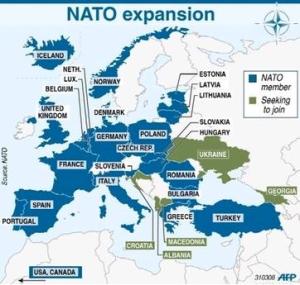The New Global Financial Order Begins in Europe
June 9, 2010
Banksters agree to force reviews on countries financial operations if ‘suspect flaws’ arise.
Financial Times

Order out of chaos. The EU takes more power away from nation-states.
European Union finance ministers agreed on Tuesday to new intervention powers for EU officials if member states’ economic statistics are suspected to be flawed.
The measure will allow officials from the EU’s statistical agency Eurostat and the European Commission to conduct “methodological visits”, sending in number crunchers to vet countries’ data if this is deemed necessary.
The intervention powers, however, will only come into play in strictly defined circumstances in which concerns have been flagged. Diplomats cite, for example, the situation in which a country revises its figures at short notice and without a clear explanation for this as a possible case for intervention.
Similar powers have been proposed in the past, but failed to secure the backing of EU member states. However, the data flaws that emerged during the Greek crisis and the new emphasis on tougher economic surveillance in the region, coupled with pressure from European parliamentarians, has persuaded countries to accept the potentially intrusive powers.
The new surveillance measure is one of the most concrete actions expected to come out of Tuesday’s meeting of finance ministers from the 27-country bloc in Luxembourg. They will also discuss economic governance – including a new stability programme for Cyprus and additional budgetary consolidation in Spain and Portugal – as well as proposals, driven by the European Commission, to strengthen financial regulation.
Some of these discussions will pave the way for further debate at the EU leaders’ summit in Brussels next week.
“There’s lots of policy debate ahead of the council meeting and those debates are pretty significant, but no meaty items,” said one diplomat.
On Monday night, Herman Van Rompuy, the EU president, who is heading a special “task force” charged with improving economic governance in the bloc, said he believed “rapid progress” could be made on budgetary and macroeconomic surveillance. Proposals in this area would now be the focus of his interim report to EU leaders next week, he said.
Mr Van Rompuy is also thought to be leaning towards the French idea of some form of “economic government” for the eurozone. French president Nicolas Sarkozy has been pushing this idea, which would involve regular summits of eurozone leaders and give the bloc its own secretariat.
On Monday, finance ministers from the 16 eurozone countries also approved details of the “special purpose vehicle” facility, which could raise up to €440bn and make up the key part of their landmark €750bn stabilisation fund for the eurozone’s most vulnerable members.
The facility, based around a “special purpose vehicle”, which will raise money to be lent to countries in financial distress, will be called the European Financial Stability Facility and is expected to become active this month.
It will be backed by pro rata guarantees from individual member states. These will be for 120 per cent of each bond issue, providing a “cushion” should any individual contributor struggle to meet its share.
Countries will only be able to tap the fund when they have agreed programmes to overhaul their economies.
Finance ministers said they would seek “the best possible” credit rating for bonds or debt securities issued by the EFSF. “The message from finance ministers is that they will do whatever it takes to get an AAA rating on the debt issued by the SPV”, said analysts at JPMorgan on Tuesday .
● Estonia will join the euro from the beginning of 2011 after winning the backing of European finance ministers for the move.
Jean-Claude Juncker, the Luxembourg prime minister who heads the so-called Eurogroup, said that Estonia had agreed to “ensure the sustainability of convergence by implementing further structural reforms”. Estonia will be the 17th member of the eurozone.

